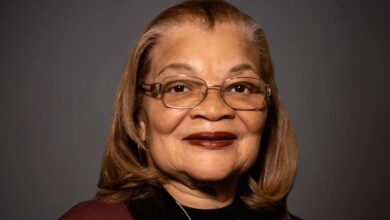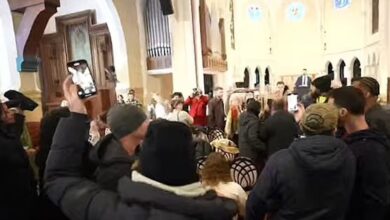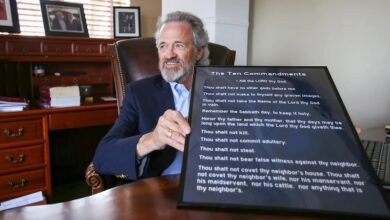Christian hostages welcomed home by President Trump
After years in a North Korean prison, three hostages found their freedom as the Christian American men were greeted by President Donald Trump beneath a giant American flag after they returned home to the U.S. last night.
First lady Melania Trump and a host of senior administration officials joined Trump to celebrate the occasion. The president and first lady boarded the medical plane on which the men traveled, to take a private moment and pray with them.
The men, Kim Dong Chul, Kim Hak Song and Tony Kim, were released Wednesday after the Trump administration successfully negotiated their release with the longtime adversary of the United States. Secretary of State Mike Pompeo secured their freedom in Pyongyang after meeting with North Korean leader Kim Jong Un on final plans for a Trump-Kim summit.
Shortly after they touched down for a refueling stop in Alaska Wednesday afternoon — the State Department released a statement from the freed men.
“We would like to express our deep appreciation to the United States government, President Trump, Secretary Pompeo, and the people of the United States for bringing us home,” they said. “We thank God, and all our families and friends who prayed for us and for our return. God Bless America, the greatest nation in the world.”
Their release comes as yet another foreign policy success emerging in from the Trump administration. Prisoner releases under the Obama administration, when successful, usually came after large cash payments or swaps, with the U.S. releasing terrorists from prison in exchange. While details are not fully known about how Trump handled this negotiation, it is believed that he believed the lives of the three American’s were important enough to make their release a condition of moving forward with peace negotiations with North Korea. It was a rare instance when a U.S. president did not have to give up anything to get American’s freed.
Those peace negotiations are scheduled to lead to meeting between Trump and the North Korean dictator later this month or in June in Singapore.
Trump seeks to negotiate the denuclearization of the Korean peninsula in his highest-stakes foreign policy effort yet. The president announced Wednesday that the demilitarized zone between the Koreas would not host the summit. Pompeo said the meeting would last one day and possibly a second.
Trump made a point of publicly thanking North Korea’s leader for the prisoners’ release — “I appreciate Kim Jong Un doing this” — and hailed it as a sign of cooling tensions and growing opportunity on the Korean peninsula. Kim decided to grant amnesty to the three Americans at the “official suggestion” of the U.S. president, said North Korea’s official news agency, KCNA.
North Korea had accused the three Korean-Americans of anti-state activities. Their arrests were widely seen as politically motivated and had compounded the dire state of relations over the isolated nation’s nuclear weapons.
Trump entered office as an emboldened North Korea developed new generations of nuclear weapons and ballistic missiles capable of hitting the continental U.S. Those advances were the subject of President Barack Obama’s starkest warning shortly before Trump took office though the Obama administration did little to assuage the North from continuing their nuclear program.
Many Trump critics reluctantly credit Trump’s brash tweets and unwillinness to back down like previous presidents as bringing North Korea to the negotiating table after 70 years of a state-of-war between the North and South. Trump has pointed to Kim’s willingness to come to the negotiating table as validating U.S. moves to tighten sanctions — branded “maximum pressure” by the president. Today’s early morning ceremony was to be an early celebration for an issue that has already put the prospect of a Nobel Peace Prize for Trump on the minds of many observers. The South Korean president recently stated Trump deserved the award.
The release capped a dramatic day of diplomacy in Pyongyang. After Pompeo’s 90-minute meeting with Kim Jong Un, he gave reporters a fingers-crossed sign when asked about the prisoners as he returned to his hotel. It was only after a North Korean emissary arrived a bit later to inform him that the release was confirmed.
State Department officials refused to discuss anything but the most basic details of their conditions, citing privacy concerns in keeping with the minimal amount of information they had released since the men were imprisoned.
The last American brought home by the Trump administration, college student Otto Warmbier, died in June 2017, days after he was repatriated to the U.S. with severe brain damage.
Warmbier was arrested by North Korean authorities in January 2016, accused of stealing a propaganda poster and sentenced to 15 years in prison with hard labor. His parents, Fred and Cindy Warmbier, have filed a wrongful death lawsuit, accusing the government of torturing and killing their son. They are also severely critical of President Obama and former administration officials for how they handled their son’s captivity.
“We are happy for the hostages and their families,” the Warmbiers said in a statement Wednesday. “We miss Otto.”
On Capitol Hill, Senate Democratic leader Chuck Schumer celebrated the detainees’ return but politicized the moment by saying that “we’ll see many more hostages” if the administration provides an incentive for imprisoning Americans.
“We are happy they’ve returned, but North Korea shouldn’t gain by taking Americans and then releasing them,” he said.
It was not clear what Schumer was referring to and his comments were dismissed by observers as inappropriate at such a moment.







